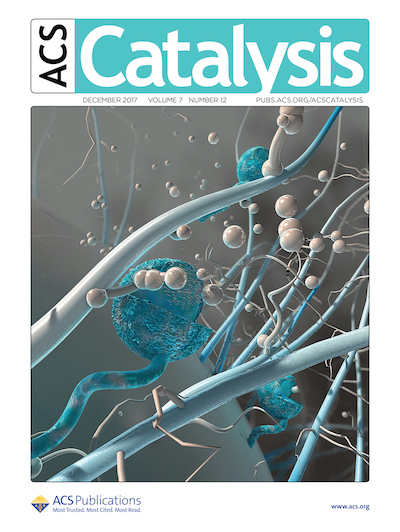Projects
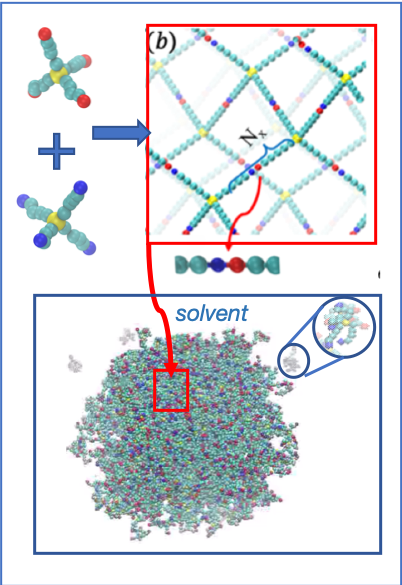
Mesoscale Modeling of Degradation and Erosion
Understanding and controlling the degradation of polymer networks plays a vital role in a variety of applications. Degradable hydrogels find their use in controlled drugs delivery, wound dressings design, as cell culture platforms, and as photolithographic materials. We are developing Dissipative Particle Dynamics framework that captures erosion, reverse gelation, and elasticity of controllably degrading polymer networks. In addition, we are also developing mesoscale approach to model chain scission during controlled degradation of thermoplastics to optimize recycling and reuse.
Vaibhav Palkar, Eric Miller, Devanshu Thakar
Related publications :
V. Palkar, O. Kuksenok "Controlling Degradation and Erosion of Polymer Networks: Insights from Mesoscale Modeling", J. Phys. Chem. B 126, 1, 336–346 (2022)
Palkar, V., Choudhury, C. K., Kuksenok, O. "Development of Dissipative Particle Dynamics framework for modeling hydrogels with degradable bonds”. MRS Advances (2020)
Choudhury, C. K., Palkar, V., Kuksenok, O. "Computational design of nanostructured soft interfaces: focus on shape changes and spreading of cubic nanogels”. Langmuir (2020) 36, 25, 7109–7123
Dynamic Control of Pattern Formation in Responsive Networks
Pattern formation plays a critical role in nature, from spontaneous organization in flocks and crowds to organs development during morphogenesis. Controlling pattern formation in synthetic materials could allow one to control a wide range of functionalities. Using continuum modeling (gel Lattice Spring Model ), we focus on dynamic control of pattern formation in confined responsive hydrogels.
Yao Xiong
Xiong, Y. et al "Phase Transitions and Pattern Formation in Chemo‐Responsive Gels and Composites" Israel Journal of Chemistry (2018).

Mesoscale Modeling of Biomaterials
We developed a native-based Dissipative Particle Dynamics (DPD) framework that captures polyalanine folding into a stable helical conformation. We now focus on further development of computationally efficient native-based DPD approaches for modeling proteins and biomaterials incorporating α-helical segments.
Chandan K Choudhury, Sidong Tu
Publications:
Choudhury, C. K., Kuksenok, O. "Native-Based Dissipative Particle Dynamics Approach for α-Helical Folding", Journal of Physical Chemistry B (2020)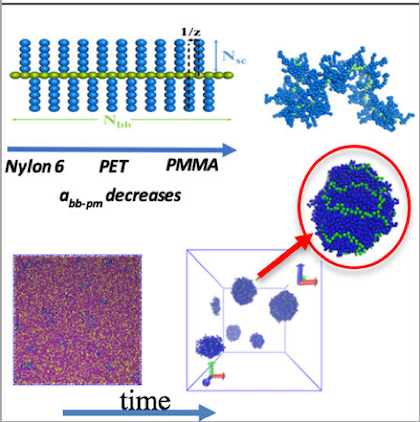
Modeling Molecular Bottlebrushes
Molecular bottlebrushes are macromolecules with side chains anchored to the backbone at high grafting densities. An ability to control the bottlebrush architecture in a relatively straightforward manner during its synthesis makes them an attractive candidate for various applications. We focus on bottlebrushes with PFPE (Perfluoropolyether) sidechains, same as in the concurrent experimental studies in Luzinov’s group. An advantage of these bottlebrush additives is that they are non-toxic and environmentally friendly. Experiments in Luzinov’s group showed that addition of a small fraction of bottlebrushes with PFPE sidechains to various polymer matrixes dramatically increases oil repellency of the films.
Sidong Tu, Chandan K. Choudhury
Collaborators: Prof. Igor Luzinov (CU) Publications:Wei, L, Caliskan, T.D., Tu, S., Choudhury, C.K, Kuksenok, O, Luzinov, I. "Highly Oil-Repellent Thermoplastic Boundaries via Surface Delivery of CF3 Groups by Molecular Bottlebrush Additives", ACS Applied Materials & Interfaces (2020) 12 (34), 38626-38637
Tu, S., Choudhury, C. K., Luzinov, I., Kuksenok., O. "Recent advances towards applications of molecular bottlebrushes and their Conjugates”. Current Opinion in Solid State and Materials Science , 23 (1), 50-61 (2019)
Designing Highly Thermostable Enzyme-Copolymer Conjugates
Focus on Hen egg white (HEW) lysozyme and copolymers
Collaborators: Prof. I. Luzinov (CU), Prof. S. Minko (UGA), Prof. I. Lednev ( UA)
Choudhury, C.K., Tu, S., Luzinov, I., Minko, S., Kuksenok, O., "Designing Highly Thermostable Lysozyme-Copolymer Conjugates: Focus on Effect of Polymer Concentration" Biomacromolecules 19 (4), 1175-1188 (2018)
Yadavalli N.S., Borodinov, N., Choudhury, C.K., Quiñones-Ruiz, T., Laradji, A.M., Tu, S., Lednev, I.K., Kuksenok, O., Luzinov, I., and S. Minko. "Thermal Stabilization of Enzymes with Molecular Brushes" ACS Catalysis 7 (12), 8675-8684
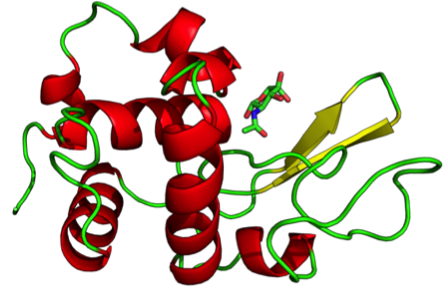
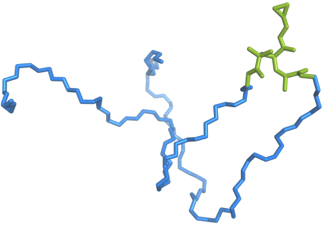
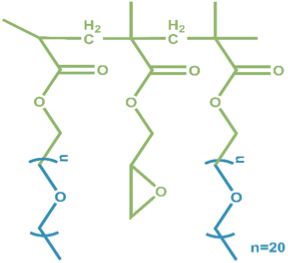

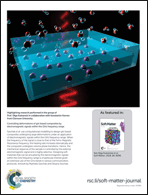
Gels Filled with Ferromagnetic Nanoparticles
Focus on selective response on GHz frequencies
Collaborators: Prof. K. Kornev (CU)
Savchak, O., Morrison, T., Kornev, K.G. and Kuksenok, O. Controlling deformations of gel-based composites by electromagnetic signals within the GHz frequency range. Soft matter, 14(43), pp.8698-8708 (2018)
